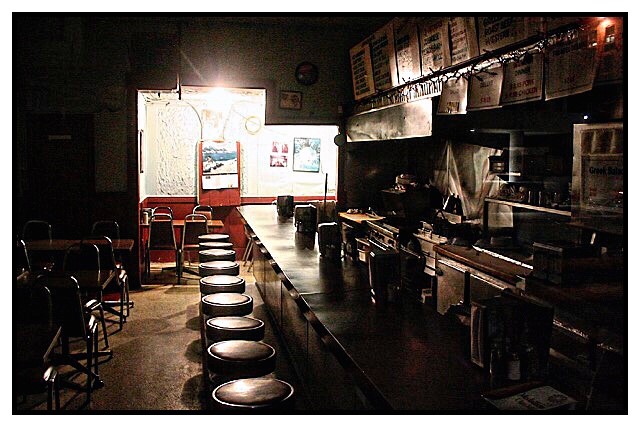Month: April 2017
Silence amidst the screams, vacancy, space between darkness and dreams
beyond paisley skies, red velvet mistakes, and muddled remnants of
happenstance and half-lived Tuesdays.
Neverland tenements where landlords fail to repair cracked windows,
broken pipes, and the noxiously rhythmical drip, drip, drip of the sink.
You don’t care anymore.
Deadbolt locks designed to keep your self safe from yourself, or
your type. It gets harder to have faith when held sway by misfortune and
the troubles you create.
Awake, if hardly asleep. Ridiculous notions, infractions on lustful wishes
meant to placate the mind during desperate times or validate your existence
as a lover, has-been; one or the other.
Somewhere in this middle-of-the-night existence, 4:23 slips away, as
only 4:24 can. Time less subjective than one can imagine. Down the hall
the television knows only one volume.
Unfettered anger thrives in this sort of dive, trash bins overflow with
long-forgotten get-rich-quick schemes, recycled promises, and the pursuit
of happiness. Or something like it.
Consumption remains a tireless game, complete with ill-conceived products
and yesterday’s shame. Tomorrow (really today) won’t promise anything anymore.
Less to discover outside any door.
Black noise in a white noise sort of way. Continual reminders of not being alone in
this awkwardness. You hear the echo of booty-call passion in the bedroom above.
It doesn’t mean anything. It never is love.
Sunrise, even sunset, less reason to see. It keeps you awake for another day. Time
even less subjective than it was an hour ago. Close the door on a short night, look
for another reflection in the mirror.
Underneath the pizza crusts and bad fast-food choices, empty calories and
abandoned wine bottles, a Bible sits in a box you never look in. You can’t deal with
the guilt. Or the lies.
©2017 j.g. lewis
It’s not much,
but it’s clean. Spotless.
Small. Nothing fancy,
never was. Real food.
Closed for the night,
and weekends.
It’s not a place
for latte and croissant.
Breakfast. The bacon sizzles,
eggs cooked to order,
sunny and runny
to dip your crusts.
Not open late,
it knows its place.
The coffee is hot,
and ready to go. Early.
A smile over the grill,
the morning hello.
©2015 j.g. lewis
A big smile for Jimmy The Greek who treated thousands of guests at The Crowbar, Princess & Adelaide (DT Toronto), for decades. Jimmy retired a while back, and breakfasts aren’t the same for so many.
Posted on April 10, 2017 by j.g.lewis // 1 CommentFortunate I, very recently, to come across a copy of The Sonnets by William Shakespeare, and to not only re-discover the magic of the bard’s words, but also the interpretation and analysis of a complete stranger.
In curiously tidy printing (in both pencil and ink) within the pages of the hardcover are passages of marginalia, contrasting or calling into question the poet’s words. Perhaps the book was a text used in university study, or maybe just a strong interest or Sunday pastime, but the notes are a total reminder of how we all interpret words and statements within our own realm or context.
Although the interpretations, at certain points, differ to my take (though my eyes have been opened to another way of looking at certain aspects of Shakespeare’s work) it reinforces my point that every poem may provide a new meaning for each reader.
In fact, one of the wonders of language itself is its ability to take on varied meanings, depending on use or phrasing. In that, it is both exciting and confusing.
Shakespeare himself is considered both exciting, and confusing. Some of that comes more from getting past the language of the day than true meaning. Those of you who may still feel the hangover of studying Macbeth or Twelfth Night in Grade 12 English, would be encouraged to look at the man’s sonnets, where storyline is limited to 14 lines. Perhaps his style is more easily digested in the non-dramatic works, or in small doses.
Words are an amazing thing — for both what they say and don’t say — in our day-to-day reading or general communication. Sometimes saying what you think and saying what you mean are two separate and distinct things.
Sometimes, whether marginalia is provided or not, you have to read between the lines.
04/10/17 j.g.l.





